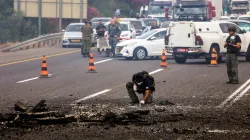Israel limits public gatherings and closes beaches after Hezbollah rocket fire, flights cancelled
Hezbollah said it fired missiles at the headquarters of Israel's Mossad intelligence agency and at a military intelligence unit on the outskirts of Tel Aviv on Tuesday. Hezbollah denied reports of Israeli troops entering the country and said it was ready for a 'direct confrontation'.

Israel Hezbollah conflict: The Israeli military on Tuesday announced new restrictions on public gatherings and closed beaches in several areas, including Jerusalem and Tel Aviv, after Lebanese armed militant group Hezbollah fired a salvo of medium-range rockets into central Israel that wounded one person earlier in the day. These guidelines came into effect after Israel said it launched a limited ground incursion in Lebanon to fight Hezbollah.
The Israeli military on Tuesday warned people to evacuate nearly two dozen Lebanese border communities hours after announcing the start of ground operations against Hezbollah. The militant group denied Israeli troops had entered Lebanon. It was not immediately clear whether Israeli troops had crossed the border.
The Israeli Army imposed restrictions on gatherings and activities in certain areas, while educational activities are to be held in a place from where it is easier to reach a standard protected space. Gatherings can be held with a limit of upto 30 people in open areas and 300 in a building.
Meanwhile, Dutch airline KLM has suspended all flights to Tel Aviv until the end of this year. On Monday, Air France also suspended Paris-Tel Aviv and Paris-Beirut flights until October 8. The Franco-Dutch group's low-cost unit Transavia cancelled flights to and from Tel Aviv until March 31, 2025, and flights to Amman and Beirut until November 3.
Hong Kong-based Cathay Pacific cancelled all flights to Tel Aviv until March 27, 2025. The US carrier Delta Airlines paused flights between New York and Tel Aviv through December 31. The UK budget airline EasyJet stopped flying to and from Tel Aviv in April and will resume flights on March 30, 2025, a spokesperson said.
'Hezbollah does not care, only intent on harming Israelis: IDF
In a video, the Israel Defence Forces (IDF) showed a Fadi-4 missile fired by Hezbollah at Israel fell directly in Kfar Qassem, an Arab village in central Israel, saying, "Hezbollah doesn’t care who, or how. They only care about harming Israelis." Hezbollah has officially denied reports that Israeli troops have entered Lebanese territory as part of their ground invasion.
In its first statement since Israel announced the start of ground operations, Hezbollah spokesman Mohammed Afifi said reports that Israeli forces had entered Lebanon were “false claims”. He said Hezbollah fighters are ready “to have a direct confrontation with enemy forces that dare to or try to enter Lebanon to inflict casualties among them”.
Earlier today, Hezbollah said it fired missiles at the headquarters of Israel's Mossad intelligence agency and at a military intelligence unit on the outskirts of Tel Aviv, where the army’s 8200 intelligence unit is headquartered on the outskirts of the Israeli city. Atif said the firing of medium-range missiles toward central Israel “is only the beginning”. Media sources reported on Tuesday morning that sirens sounded in Tel Aviv following the missile attack on Israel by Hezbollah, as panic spread throughout the central region of the country, including Tel Aviv. Several explosions were heard in Tel Aviv throughout the day.
Israel orders evacuation of Lebanese communities
Meanwhile, the Israeli military on Tuesday ordered the evacuation of nearly two dozen Lebanese border communities. The evacuation order, posted by the Israeli military's Arabic spokesman on the social media platform X, specified around two dozen communities in southern Lebanon and ordered people to evacuate north of the Awali River, some 60 km from the border.
That is farther than the Litani River, which marks the northern edge of a UN-declared zone that was intended to serve as a buffer between Israel and Hezbollah after the 2006 war. The Litani River is 30 km from the border. This came after Israel announced a new phase of war against Hezbollah along Lebanon's southern border, saying it would aim to bring home Israelis who have fled Hezbollah rockets during nearly a year of border warfare.
Israel's apparent ground raids follow its deadly detonation of booby-trapped Hezbollah pagers, two weeks of airstrikes, and then its killing on Friday of Hezbollah head Hassan Nasrallah, one of the heaviest blows in decades to the group. The intensive air strikes have eliminated several Hezbollah commanders but also killed about 1,000 civilians and forced one million to flee their homes, according to the Lebanese government.
(with inputs from agencies)
ALSO READ | Hezbollah denies Israeli troops entering Lebanon, says it is ready for 'direct confrontation'
ALSO READ | Lebanon facing 'one of most dangerous stages in history', says PM as Israel launches ground invasion

